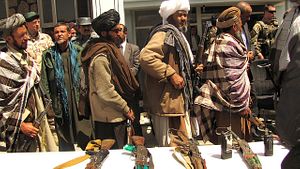Afghan officials confirmed for the first time this week that the terror organization ISIS, which controls large stretches of territory in Iraq and Syria, is operating in Southern Afghanistan. According to BBC sources, Islamic State fighters have been battling Taliban forces in the southwestern province of Helmand with about 20 people from both sides killed and injured.
The Associated Press reports that Mullah Abdul Rauf, a former corps commander under the Taliban rule of Afghanistan, had a falling out with the Taliban leadership in the Pakistani city of Quetta, after which he replaced White Taliban flags with the black flags of the Islamic State, donned black battle fatigues, and pledged allegiance to ISIS leader Abu Bakr al-Baghdadi.
The Wall Street Journal reports of a 16 minute propaganda video published last Saturday, which purportedly shows a former Pakistani Taliban spokesman pledging his allegiance to the terror group Islamic State and claiming that a number of Taliban field commanders have defected with him. “We are gathered here with commanders from 10 units. They all want to pledge their allegiance to the caliph of all believers, Abu Bakr al-Baghdadi,” proclaims the former spokesperson, Shahidullah Shahid, according to Wall Street Journal reporters who have seen the video.
Afghan officials do not seem to be excessively worried that the group will gain traction with Afghans. The BBC quotes the Governor of Nimruz province: “Once they fought under al-Qaeda name, then as Taliban, and now IS, they are the same people with the same programmes.” A key difference, however, is that the Taliban does not endorse the pan-Islamic model of global jihad that ISIS does, and usually confines its operations to Afghanistan and Pakistan.
A December UN report noted that there had been an increase in the activities of al-Qaeda affiliates in Afghanistan over the past year. The report singles out ISIS as constituting a challenge to the fragmented Taliban movement, whose spiritual leader, Mullah Mohammad Omar, has not been seen in public since 2001. The report notes that Afghan security forces have retrieved ISIS propaganda material from insurgents.
The report also emphasized that, “Taliban leadership was concerned that the success of ISIL in parts of northern Iraq would draw young people who were potential Taliban recruits to join ISIL in Iraq.” It said that two prominent supporters of the Taliban have publicly endorsed the leader of the terror group Islamic State, Abu Bakr al-Baghdadi.
Most interestingly, the UN report noted that several Afghan media articles have reported that Abu Bakr al-Baghdadi had lived in Kabul under the Taliban regime under the alias Ibrahim Awwad Ibrahim Ali al-Badri al-Samarrai and that he worked closely with al-Qaeda groups in the country at that time.
While could just be motivated by opportunism inspired by the recent successes of ISIS in Iraq and Syria, the emergence of this new militant force in Afghanistan could pose a challenge to efforts by Afghan President Ashraf Ghani to re-launch peace talks with the insurgents. As The Diplomat reported last week, the Taliban has rejected Ghani’s recent peace overtures and turned down cabinet positions in the new Afghan government.

































